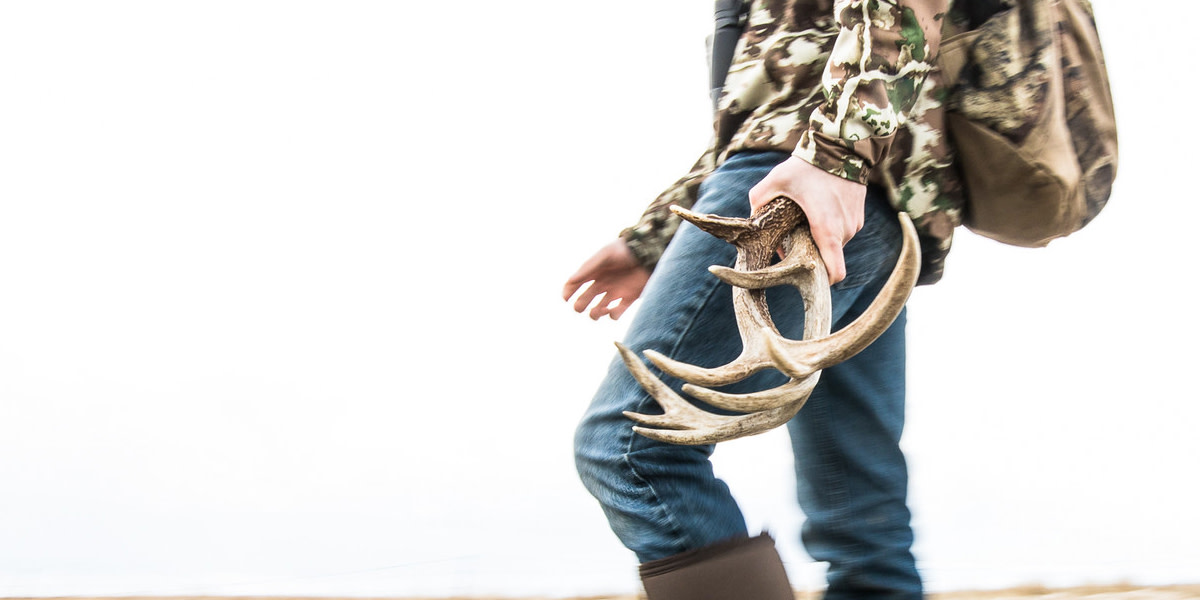
Shed hunting has become a wildly popular off-season activity for many hunters who hold a deep love of the animals they pursue. It’s a great way to cure cabin fever and gather a few totems from favorite game animals. Finding a matched set of dropped antlers from a big buck or bull is like hitting the lottery.
It’s a unique feeling to be able to hold an antler from an animal that’s still running around out there. Hunters can also learn a lot about the habits of bucks and bulls based on where they find those sheds. An antler also offers up hope and anticipation for the upcoming fall hunting seasons. But shed hunters need to consider the impact they’re having on wintering deer and elk.
Weathering the Winter
With serious snow storms frequently pummeling the West, winter makes survival extremely tough for big game animals in many areas, even outside the Rocky Mountain region. Across the northern half of the country, even in an average winter, it is a struggle for all big game to make it through to spring. When extreme cold combines with snow levels that are high enough to restrict travel and feeding, many big game animals are living on borrowed time.
Fawns and calves along with older bucks and bulls suffer the highest winter mortality rates. Deep snow makes feeding and travel more difficult for young animals. Older bucks and bulls enter winter worn out from the rut with little in the way of fat reserves. Extreme cold compounds the problems, as it becomes harder to maintain body weight and temperature. This leads to death by starvation, exposure, disease and makes deer and elk more vulnerable to predation.
Otherwise healthy does or cows may even abort fetuses during exceptionally tough winters. Even for those animals that make it through winter, early spring often brings the highest mortality rates. It’s often said that winter weakens and spring kills.
When wintering deer and elk are stressed, it only compounds the issues.
Daryl Meints, Idaho Department of Fish and Game’s deer and elk coordinator, said in an article on the state’s website, “Wintering big game animals are very susceptible to any kind of disturbance whether it is from passing motorists, domestic dogs or shed hunters in late winter and early spring. There’s growing concern over shed hunters putting additional stress on wintering big game in many areas of the state.”
Give Them Space
Shed hunting can have some deadly implications for animals depleted by the rigors of winter survival. Just as antlers begin to drop, deer and elk are often in a situation where they are experiencing a caloric deficit. They are expending more energy than poor winter foraging conditions can replace. So, when shed hunters inadvertently push or spook animals, that energy expenditure might be enough to push deer over the edge.
I used to get pretty serious about shed hunting and built up quite a collection of drops. Every spring the pile grew as I searched for mule deer and elk antlers of trophy proportions. But, over time, my attitude towards shed hunting began to change. Bumping big groups of deer and elk was a regular occurrence and every now and then I would come across animals too weak to run or already dead in their beds. I still look for sheds while I’m out turkey hunting after wintering herds have dispersed but I’ve given up searching for antlers during late winter and early spring.
Many states throughout the West have created shed hunting seasons to protect wintering animals from being harassed. These seasons only open after the worst of winter has passed and deer and elk have moved away from their winter range to higher elevations.
Shed Hunt Ethically
Winter kill is a natural phenomenon that deer and elk have overcome for thousands of years, but a smart, conscientious hunter should avoid being the source of undue stress. This does not mean you should stop shed hunting altogether, but you’ll be doing the ungulates a favor if you wait to search for dropped antlers until later in the spring. Just by giving deer and elk a little more space when they need it most, you may even find more sheds.
Animals that are comfortable staying in a given area are likely to drop their antlers in a more concentrated manner. Once deer and elk have left their wintering grounds, sheds that aren’t widely dispersed are easier to find.
During tough winters it is especially important for hunters to be thinking about the future of animal populations. Simply put, a trophy-sized buck that dies this winter will not be around the following breeding or hunting season, and he won’t produce another set of sheds next year.






Conversation